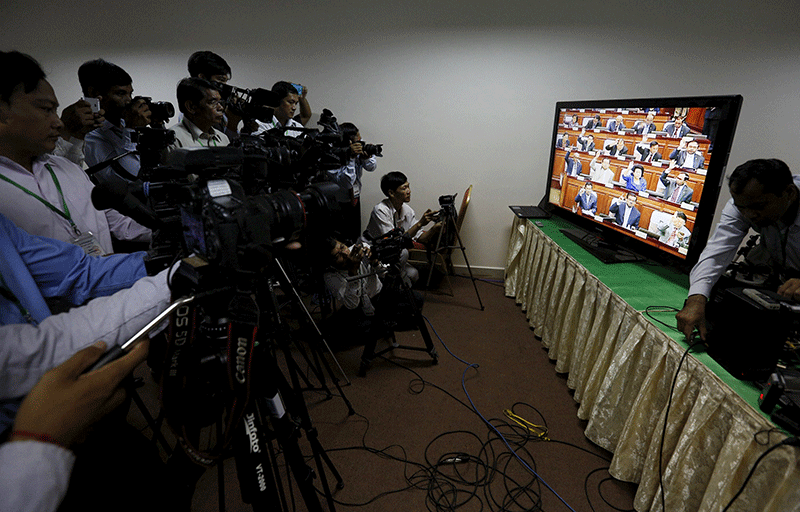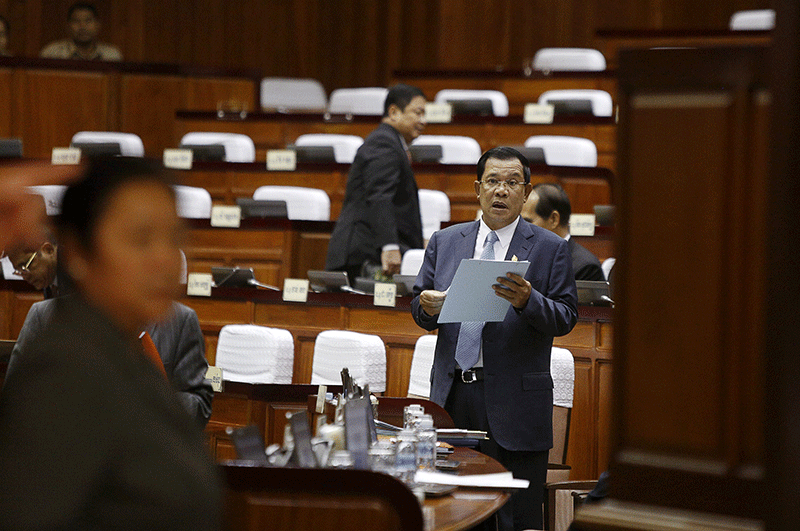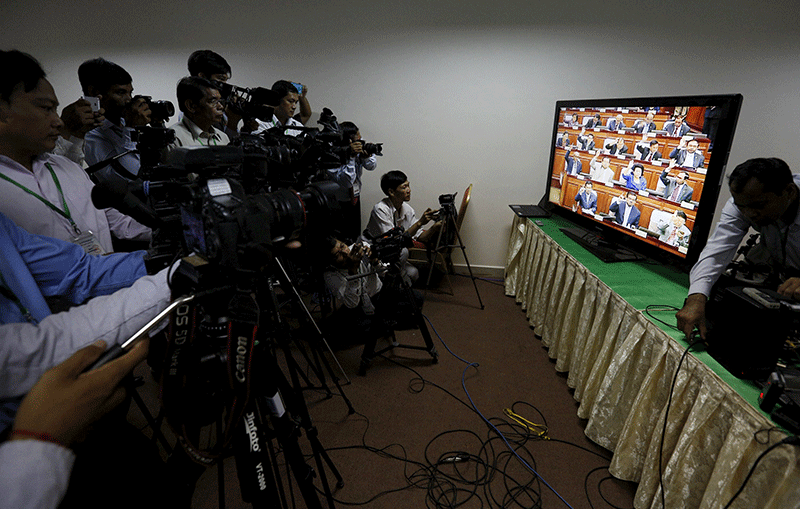Ruling party lawmakers removed deputy opposition leader Kem Sokha as first vice president of the National Assembly on Friday in a vote that was boycotted by the CNRP, which was joined by legal experts in calling the ouster unconstitutional.
The morning session came four days after two CNRP lawmakers were attacked outside the Assembly during a protest led by a CPP-affiliated youth group demanding that Mr. Sokha resign his parliamentary post.

Before the vote, Assembly President Heng Samrin gave instructions to the parliamentarians on how they should vote.
“Please cast ‘Yes,’ not ‘No,’ because sometimes those casting votes get confused and think the word ‘No’ refers to removal,” he said.
All 68 CPP lawmakers then dutifully cast their “Yes” ballots, officially removing Mr. Sokha from his leadership position.
“In accordance with votes cast to remove His Excellency Kem Sokha from the first vice presidency of the National Assembly, I announce solemnly that His Excellency Kem Sokha is successfully removed from his position as first vice president of the National Assembly,” Mr. Samrin announced at about 9 a.m.
Mr. Sokha’s dismissal is just the latest political blow inflicted by the CPP on the opposition party since the mid-2014 detente that ended the CNRP’s yearlong boycott of the National Assembly.
In August, opposition senator Hong Sok Hour was arrested and charged with forgery and incitement over a video he posted online showing a fake border treaty. Last Sunday, Prime Minister Hun Sen warned CNRP president Sam Rainsy that he could face prosecution in the same case—and that if convicted, he would not be pardoned.
Then, on Monday, during a protest against Mr. Sokha outside the Assembly, two opposition lawmakers—Nhay Chamroeun and Kong Saphea—were pulled out of their SUVs and repeatedly stomped on and kicked in the face.
Civil society groups were quick to blame the CPP for the attacks. Prime Minister Hun Sen had personally promoted the protest against Mr. Sokha in a speech the night before, but condemned the violence during a televised address on Wednesday night.
During Friday’s parliamentary session, lawmakers were scheduled to debate and pass changes to the internal rules of the National Assembly and a new commune election law.
Just before the session convened, however, the CPP-controlled permanent committee met and put a vote to remove Mr. Sokha at the top of the day’s agenda, leading the CNRP to boycott the session.
After the vote, speaking from the National Assembly floor, senior CPP lawmaker Cheam Yeap said the Assembly was obliged to reconsider Mr. Sokha’s position because 63 CPP lawmakers—ostensibly acting on the demands of their constituents—had signed a petition asking for it.
Mr. Yeap accused Mr. Sokha of being unrelenting in his efforts to undermine the political detente struck last year.
“His Excellency Kem Sokha always wants to damage the deal,” Mr. Yeap said. “Whenever he goes somewhere he creates chaos, which affects the peace, and that’s prohibited by the 1993 Constitution.”
“He’s always saying something that causes disputes between the two parties,” he added. “We have documents to prove that whenever His Excellency Kem Sokha… goes somewhere, he slanders the CPP’s leaders.”
The CNRP, however, said it was the CPP that had violated the Constitution with the morning’s maneuver. In a statement, the party said the removal of Mr. Sokha involved “serious irregularities,” including “violation of the Constitution of the Kingdom of Cambodia, as the Constitution does not state any provisions relating to the authorization to issue a blaming motion or to remove the position or function of the president or deputy president of the National Assembly.”
The Constitution only lays out provisions for the replacement of the Assembly president or vice president—by a majority vote of the Assembly—in case of a resignation or death.

The CNRP said the morning’s vote also broke the political agreement it struck with the CPP in July last year, which included a guarantee of several key legislative positions for the opposition, including first vice president of the Assembly.
Prominent attorney and civil rights advocate Sok Sam Oeun agreed that Mr. Sokha’s removal appeared unconstitutional.
“If we look at the Constitution, I don’t see any provision relating to the removal of the [National Assembly] vice president,” he said.
“It must be consistent with the Constitution. What do you think if it is not consistent with the Constitution? It’s unconstitutional, right?”
Koul Panha, executive director of the Committee for Free and Fair Elections, said there were no rules or laws to justify the CPP’s move to force Mr. Sokha from his post.
“It is not legal. Not legal means no law, no procedure, no nothing,” he said.
“In the rule-of-law society there must be laws, but in Cambodia there is no law,” he added. “In some countries they say if there is no law, it is illegal. But in Cambodia, if there is no law, they still practice.”
On Thursday, the CPP had hinted that Mr. Sokha’s position was on the line and said he could be voted out by ruling party lawmakers because it was their majority that secured his ascension to the vice presidency in the first place.
But Mr. Panha rejected the argument, saying that the ruling party appeared to be making up the rules as it went along. He said Mr. Sokha’s removal opened the way for the ruling party to replace him with one of its own members —since the position is not promised to any party by law—or pressure the CNRP into nominating a more pliable alternative.
“That’s the way they do with Funcinpec; they say ‘I want that guy,’” he said, referring to the CPP’s erstwhile coalition partner, whose role in the arrangement was gradually ground down to nearly nothing. With its parliamentary majority, he said, “the CPP is the one who will make the decision.”
Stepping away from the Assembly’s afternoon session to speak with reporters, CPP lawmaker Chheang Vun insisted that the vote was completely legal.
“The parliament does everything in accordance with the law,” said Mr. Vun, who is also the Assembly’s spokesman. “In parliament, there are three key laws we use. First, there is the Constitution. Second, there are the internal rules. Third, there is the law on the status of parliamentarians.”
With Mr. Sokha out, Mr. Vun said the ruling party would give the CNRP the chance to nominate another of its lawmakers for first vice president, since the position had been promised to the opposition party in last year’s deal.
CNRP lawmaker Eng Chhay Eang said the opposition would not be nominating anyone else, at least until the two parties had a chance to meet and discuss yesterday’s vote.
“Now they removed him based on their will, so we cannot keep playing and playing in a political game without clear rules,” he said.
(Additional reporting by Zsombor Peter)




